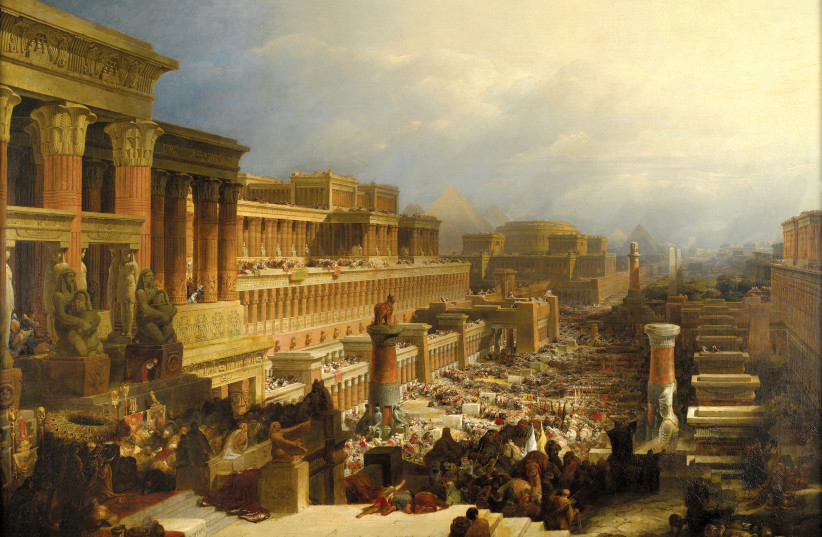Pharaoh dying in the firstborn plague would lead to the immediate crowning that night of a new Pharaoh. This is further supported by the word “rose”: “And Pharaoh rose up in the night.”
By GOL KALEV Published: MAY 5, 2023
How many Pharaohs were there between the time of the Exodus and the time the Hebrews crossed the sea?
The popular read of the story told in the Book of Exodus is about one Pharaoh who changes his policy a number of times due to God’s miracles.
But could there have been more than one?
The Pharaoh with whom Moses and Aharon engaged during the first nine plagues makes clear in their last reported bilateral meeting that this is the last time they will see each other. Moses agrees: “And Pharaoh said unto him: ‘Get thee from me, take heed to thyself, see my face no more; for in the day thou see my face thou shalt die. And Moses said: ‘Thou hast spoken well; I will see thy face again no more.”
Then comes the tenth plague that kills the firstborn, and following it, a surprise: a meeting between Pharaoh and Moses. This inconsistency can be reconciled if this is a different Pharaoh.
Moreover, it is made clear that all firstborns die, including Pharaoh’s firstborn. Indeed, Pharaoh was likely a firstborn himself. We learn from multiple sources about a firstborn-based ruling system, including in Laben’s scolding of Jacob, and later in the Hebrews’ transition of power from the firstborns to Levis.
Departure of the Israelites ‘Departure of the Israelites’ by David Roberts, 1829. (credit: DAVID ROBERTS/WIKIPEDIA)
Pharaoh dying in the firstborn plague would lead to the immediate crowing that night of a new Pharaoh. This is further supported by the word “rose”: “And Pharaoh rose up in the night.”
This terminology was used to describe a new Pharaoh taking power before: “A new king has risen over Egypt who did not know Joseph.”
Indeed, the behavior of the “second Pharaoh” seems different. Unlike his past behavior, he does not try to negotiate the terms of the Exodus. Similarly, in the past, Pharaoh conceded only in order to stop a plague. Suddenly, this Pharaoh concedes without a threat and without getting anything in return. (The firstborn are already dead.)
Moreover, in a startling departure from past behavior, this Pharaoh asks to be blessed! We know blessings have strong meaning; much of the Book of Exodus deals with the power of blessings, and Jacob blessed the Pharaoh of his time.
Does the “The Hebrew Question” dominate Egyptian politics?
We know there were political camps in Hebrew politics. There was the “remain” camp, led by the likes of Dotan and Aviram, who wanted to be in Egypt; and there was the “exit” camp led by Moses.
It is likely that there were camps in Egypt as well. “The Hebrew Question” was no doubt a significant issue for Egyptians. Should we disengage and let them go – a divorce, a clear break, ending decades of Hebrews living in Egypt? (The pro-Israel camp). Or should we keep them? After all, it seems the Egyptian economy is dependent on Hebrew slaves.
As the plagues progress, we can ascertain that the entirety of life in Egypt is affected by “The Hebrew Question”: economic, social, health, security and eventually an issue of life and death.
In this column, we have discussed various lessons from Theodor Herzl that can be applied to today, and to understand the past. One is the limited power that even kings have relative to their people, as Herzl wrote to refute the view that monarchs can defend Jews from chronic European Jew-hatred: “Even if we were as near to the hearts of princes… they could not protect us. They would only feel popular hatred by showing us too much favor,”
So when a new Pharaoh rose – an exceptionally weak Pharaoh, given the circumstances mentioned above – he is likely to try to be in tandem with the will of his subjects.
And what was the will of the Egyptians?
We know that the Egyptian people were pro-Israel: “And the Lord gave the people favor in the sight of the Egyptians.”
It would be ill-advised for a seemingly weak Pharaoh to go against the will of the Egyptians (as the Israelite King Rehoboam learned a few centuries later). Indeed, the “second Pharaoh” goes along with the people and executes the disengagement plan: He specifies that all can go, with assets, and even asks for the blessing.
Seemingly, the “second Pharaoh“ surrendered to his subjects.
It is logical that some in the Egyptian apparatus did not like this new king’s decision, with his new administration of inexperienced people being new to power and never groomed for it (not firstborns).
The three Pharaohs theory
We know that coup d’etats were a viable risk in Egypt. After all, the initial over-enslavement of the Israelites was based on a fear that they will “rise from the land.”
As Herzl reflected, there are built-in tensions between the interests of the government/monarch and that of the people. Israeli singer Meir Ariel, who sang about the Exodus, said that even in a democratic system, “There is no such thing as the rule of the people. The people are always ruled.”
Did some in Egypt say, “Let’s get someone in there who knows what he is doing. Someone who will rule his people and not be ruled by them”?
Indeed, when we next hear about the Pharaoh, he again behaves very differently than the one who was amicable to Moses.
The key words that support the possibility there was a coup are “was told”: “And it was told to the king of Egypt that the people fled.” If it was the same Pharaoh, he would have known, since he is the one who sent them out. But a new “third Pharaoh” needs to be briefed.
The nature of the briefing provides additional supporting evidence to the “coup theory”: Unlike in the course of the nine plagues, when God hardened the Pharaoh’s heart a few times, here,we are told that it is the Pharaoh who attempts to turn the pro-Israel Egyptians! “The heart of Pharaoh and of his servants was turned toward the people.”
In what could be viewed as a “dramatic address to the nation,” this Pharaoh does what some new leaders (even new CEOs) are advised to do: Chastise the previous regime to lower the expectation base. He scolds the decision to “let Israel go from serving us.”
In addition, coups happen when the ruler is not perceived as legitimate. A non-firstborn is likely an unprecedented “brand new thing.” Moreover, coups happen when there is turmoil and people are not happy, as certainly was the case with the Egyptians burning their dead.
The idea of a coup in the lead-up to the Egyptians chasing the Israelites is speculative and not supported by commentators nor Jewish tradition. However, it is plausible enough to be used as an exercise in applying our contemporary experience to better understand the Torah, and vice versa. ■
The writer is author of Judaism 3.0: Judaism’s Transformation to Zionism (Judaism-Zionism.com). For more of his biblical analysis, see ParashaAndHerzl.com


